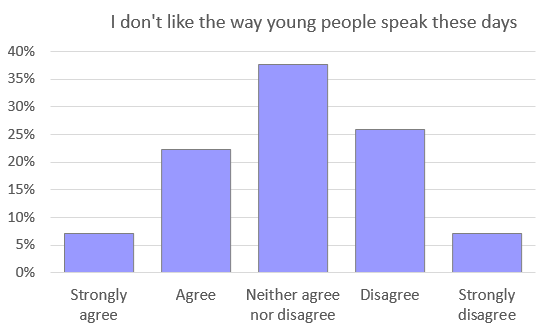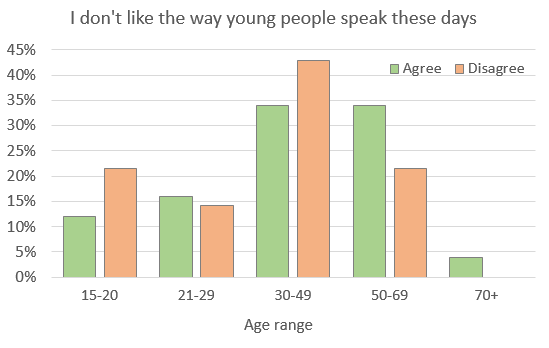A short survey looking at attitudes towards the language of young people in Britain.
This was a short survey that was made available in 2016 on this site. It asked about people’s feelings towards the language of young people. Obviously with all these kinds of surveys in which the respondents are self-selected there are questions of bias; however, there are still a few interesting results.
The survey generated 170 complete responses. All the results here come from those 170 responses, or a subset of those responses. 112 respondents were female, 56 male, and 2 identified as non-binary. 36 were aged 15-20, 23 were aged 21-29, 68 were aged 30-49, 41 were aged 50-69 and 2 were aged over 70.
In response to the statement ‘I don’t like the way young people speak these days’, there was a remarkably neat distribution:
However, there was an understanding that young people do speak differently to older people:
Those people who either agreed or strongly agreed with the statement ‘I don’t like the way young people speak these days’ (50 people) were asked if they could say what it was they didn’t like. It was pretty even. Incidentally, 6 of the 9 ‘other’ answers were to do with swearing.
I then thought it might be interesting to see if age was a factor in liking or disliking young people’s speech. The next chart shows people’s responses to the statement ‘I don’t like the way young people speak these days’ colour-coded into those who agree or strongly agree (‘agree’ in the chart) and those who disagree or strongly disagree (‘disagree’ in the chart). These 106 people are divided into age ranges. There’s a slight tendency for younger people to be more positive towards young people’s speech than older people, which is probably to be expected.
I then looked at the same question with regard to a gender difference. It would appear that men or more likely than women to have negative feelings towards the speech of young people.
But for me, the most interesting finding relates to the type of contact the respondents have with young people. Here, the responses to the statement ‘I don’t like the way young people speak these days’ have been divided according to the responses to the question ‘What contact do you have with the young people you are referring to?’ The question was open, so the categories reflect key words used in the responses. ‘General’ might refer to on the bus, daily life, etc, ‘Family’ refers to children, grandchildren, cousins etc, and ‘Work’ refers to dealing with young people as customers or having young people as colleagues. What’s interesting is if we compare the ‘Teacher’, ‘Work’, and ‘General’ categories. It seems to me that the respondents who work with young people as teachers have a far more open attitude towards young people’s language than both the respondents who encounter them at work and those who only have general contact with them. In fact, apart from young people themselves, teachers are the only group who are more likely to have a positive rather than a negative attitude to young people’s language, more likely even than family members!
It isn’t surprising that teachers, who we would like to think are positive towards young people in general, are more positive towards the way they speak. But also, the fact that those who only have general contact with young people are more likely to be negative about their speech supports my growing impression that a lot of this negativity is down to ignorance. If we judge people by the way they speak only through overhearing them on the bus or in the park, we are going to get a very warped view of their language. The issue, as I’ve stated elsewhere on this site, is that those limited perceptions are then used in prejudicial ways against the speech of young people in other contexts.
This was a limited survey, and perhaps we shouldn’t read too much into the results. But even if the sample is biased, it’s still good to see so many respondents with positive views towards the speech of young people. My suggestion is that they are the ones who actually spend time with young people, and are more aware of their language capabilities.
If you have any questions about any of this, please feel free to contact me.
Rob






